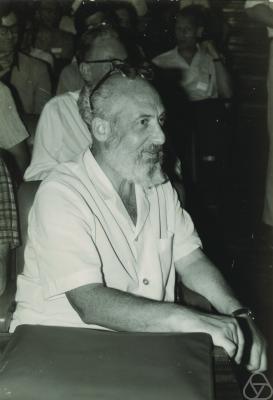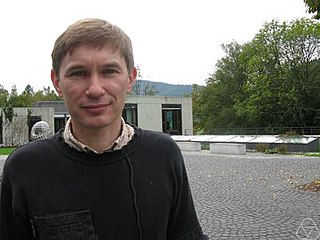Related Research Articles

Algebraic topology is a branch of mathematics that uses tools from abstract algebra to study topological spaces. The basic goal is to find algebraic invariants that classify topological spaces up to homeomorphism, though usually most classify up to homotopy equivalence.

Samuel Eilenberg was a Polish-American mathematician who co-founded category theory and homological algebra.
Daniel Gray "Dan" Quillen was an American mathematician. He is known for being the "prime architect" of higher algebraic K-theory, for which he was awarded the Cole Prize in 1975 and the Fields Medal in 1978.
Daniel Marinus Kan was a Dutch mathematician working in category theory and homotopy theory. He was a prolific contributor to both fields for six decades, having authored or coauthored several dozen research papers and monographs.

Victor Matveevich Buchstaber is a Soviet and Russian mathematician known for his work on algebraic topology, homotopy theory, and mathematical physics.
Tudor Ganea was a Romanian-American mathematician, known for his work in algebraic topology, especially homotopy theory. Ganea left Communist Romania to settle in the United States in the early 1960s. He taught at the University of Washington.

Peter John Hilton was a British mathematician, noted for his contributions to homotopy theory and for code-breaking during World War II.
John Coleman Moore was an American mathematician. The Borel−Moore homology and Eilenberg–Moore spectral sequence are named after him.
Jon Peter May is an American mathematician working in the fields of algebraic topology, category theory, homotopy theory, and the foundational aspects of spectra. He is known, in particular, for the May spectral sequence and for coining the term operad. The word "operad" was created by May as a portmanteau of "operations" and "monad".
Steve Shnider is a retired professor of mathematics at Bar Ilan University. He received a PhD in Mathematics from Harvard University in 1972, under Shlomo Sternberg. His main interests are in the differential geometry of fiber bundles; algebraic methods in the theory of deformation of geometric structures; symplectic geometry; supersymmetry; operads; and Hopf algebras. He retired in 2014.
Mark Edward Mahowald was an American mathematician known for work in algebraic topology.

James Dillon Stasheff is an American mathematician, a professor emeritus of mathematics at the University of North Carolina at Chapel Hill. He works in algebraic topology and algebra as well as their applications to physics.
Haynes Robert Miller is an American mathematician specializing in algebraic topology.

Brooke Elizabeth Shipley is an American mathematician. She works as a professor at the University of Illinois at Chicago, where she was head of the Department of Mathematics, Statistics and Computer Science from 2014 to 2022. Her research concerns homotopy theory and homological algebra.
Joseph Alvin Neisendorfer is an American mathematician known for his work in homotopy theory, an area of algebraic topology. He is a Fellow of the American Mathematical Society.

Julia Elizabeth Bergner is a mathematician specializing in algebraic topology, homotopy theory, and higher category theory. She is a professor of mathematics at the University of Virginia.
Charles Waldo Rezk is an American mathematician, specializing in algebraic topology, category theory, and spectral algebraic geometry.
Aldridge Knight Bousfield, known as "Pete", was an American mathematician working in algebraic topology, known for the concept of Bousfield localization.

Dan Burghelea is a Romanian-American mathematician, academic, and researcher. He is an Emeritus Professor of Mathematics at Ohio State University.

Alexander A. Voronov is a Russian-American mathematician specializing in mathematical physics, algebraic topology, and algebraic geometry. He is currently a Professor of Mathematics at the University of Minnesota and a Visiting Senior Scientist at the Kavli Institute for the Physics and Mathematics of the Universe.
References
- 1 2 "Home Page at the University of Notre Dame".
- ↑ William Gerard Dwyer at the Mathematics Genealogy Project
- 1 2 "William G. Dwyer, Doctor Honoris Causa" (PDF).
- ↑ Dwyer, William G. (1998). "Lie groups and p-compact groups". Proceedings of the International Congress of Mathematicians. Vol. 2. pp. 433–442.